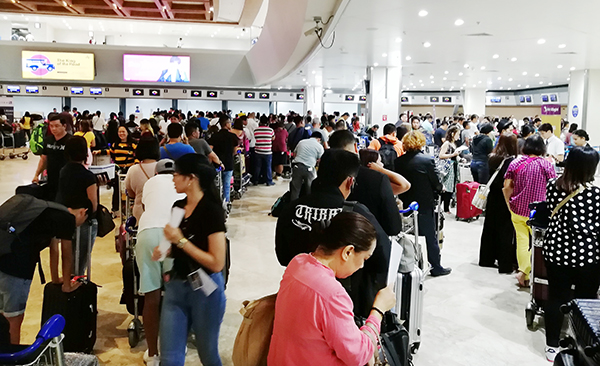DUBAI: The ball is now with the Supreme Court to reinforce or nullify the constitutionality of the mandatory Social Security System (SSS) contributions for overseas Filipino workers (OFWs).
Under Republic Act No. 11199 or the Social Security Act of 2018, returning and rehired land-based overseas Filipino workers (OFWs) are mandated to pay contributions to the SSS an amount equivalent to three monthly contributions with a total of Php2,280 or approximately Dh160, as first payment. New hires are required to pay a month’s contribution, or Php960, approximately Dh68.
The OFWs have a choice of contribution rate from Php960 to Php2,400.
The Filipino Times interviewed stakeholders and presents the pros and cons of the compulsory SSS coverage for all OFWs.
Earnings increase
The state-run pension fund has reported that its net income went up from Php2.83 billion in the first half of 2018 to Php15.32 billion in the same period this year due to the new law, which was signed by President Duterte on Feb. 7, 2019.
This increase enabled SSS to disburse P55.7 billion in retirement benefits to some 1.57 million pensioners from January to June. Disbursement for death claims, disability, funeral and sickness benefits also went up.
“This is primarily due to corporate collection efforts, as well as the increase in the contribution rate and in the maximum and minimum salary credit effective April 2019,” SSS President and Chief Executive Officer Aurora Ignacio said in a statement,
But while many SSS beneficiaries are hailing the move to increase contributions, most OFWs expressed concerns about the looming full implementation of the law’s implementing rules and regulations (IRR), which has a provision requiring them to first be members and pay up their contributions before they could be issued an Overseas Employment Certificate (OEC).
There are approximately 2.3 million OFWs working around the world during the period April to September 2018, according to figures released in April this year by the Philippine Statistics Authority (PSA).
With this, SSS expects to Php5.24 billion in new membership collections.
The World Bank has, as early as 2016, been raising the red flag on SSS, saying the pension system’s assets would be depleted in 28 years if vital reform measures are not implemented fast, including improvements in the collection and coverage.
Meantime, a number of OFWs, represented by lawmakers, has petitioned the Supreme Court to junk Republic Act 11199 on grounds that while workers in the Philippines have employers sharing in their monthly contributions, they on the other hand will be paying in full.
The law states that a bilateral agreement between the Philippines and the host countries needs to be signed to require employers of OFWs there to pay at least 8% of their employee’s SSS contributions.
In the absence of such agreement, an OFW will be considered self-employed in which case he would have to pay the full 12% SSS dues from his salary.
Not against
Most overseas Filipinos said they are not against being mandated to pay SSS contributions, considering the benefits.
What apparently has become the bone of contention is the controversial provision requiring SSS payments so that an OEC can be issued.
The OECs are required from OFWs when leaving the country for work abroad to confirm their legal status at the airports.
Two international OFW groups have renewed calls to review and reconsider the OEC policy because they said it is a “redundant requirement” as POEA already has a database of documented migrant workers and all that needs to be done is for thegovernment agency to digitally coordinate with Immigration officers.
Benefits of SSS membership
Republic Act 11199 requires SSS to provide financial assistance to members who lost their jobs in the form of a one-time payment worth 50% of their monthly contribution.
Mark Roue Oliva, SSS foreign representative in Dubai and the Northern Emirates, explained that the dues-paying member must have made 12 months of contribution within an 18-month period “immediately preceding the month of involuntary separation.”
Oliva also said that the financial assistance can be availed of once every three years.
“Kung sa loob ng three years, dalawa o tatlong beses natanggal sa trabaho ang OFW, pwede makapag-avail ng unemployment benefit ng isang beses,” he said.
Salary and education loans
Other benefits include SSS educational assistance where up to Php20,000 is available per semester for a college degree and Php10,000 per semester for a vocational/technical course, payable in 5 years for college degree and three years for vocational/technical course. Qualified are SSS members with a basic salary of Php25,000.
There is also a salary loan of which there are two kinds: One-month salary loan and two-months, where for one-month loan, 36 monthly contributions are required and for two months, 72. Note that six of the monthly contributions should have been made with a year before the loan is filed. Payment: Employed members need only to inform their employers so that deductions can be made from the salary; self-employed and voluntary members need to fill up a form and pay at SSS outlets.
Monthly pension
Most OFWs learning the value of financial literacy are now realizing the importance of preparing for retirement, officials and advocates said.
To this end, SSS membership plays an important role in providing additional retirement fund on top of passive income and a small business.’
With their monthly SSS contributions, OFWs can receive a monthly retirement pension of from Php6,400 to Php8,000.
The law
Republic Act 11199 raised the SSS contribution rate from 11% to 12% of the salary in 2019. Further hikes are as follows: 13% in 2021, 14% in 2023, and 15% in 2025.
Two-thirds of the amount will be shouldered by the employer, while one-third will be deducted from the employee.
New Social Security Commission (SSC) chairman Carlos Dominguez III has emphasized the need to reduce the state-run pension fund’s overhead expenses and use digital tools to make it easier for its members to access services.
“We need to be very prudent in managing expenses because we are talking about the hard-earned savings of Filipino workers. The new SSS law has provided the means to beef up the pension fund through contribution rate adjustments,” Dominguez said.
“What you put in SSS as savings today is what you will receive in benefits in the future. The increase in contributions is an opportunity for members to save more for contingencies, and particularly for retirement,” he stressed.
IRR consultation
No less than POEA chief, Atty. Bernard Olalia, has expressed dissent on the IRR provision, having issued a position paper expressing his concerns.
“Hindi po tayo pumayag sa gusto ng (SSS). Hindi pwedeng i-connect sa OEC ang SSS contributions,” he told The Filipino Times in an overseas phone interview from Manila.
“Hindi po nakonsulta ang industry. Hindi nakuha ang comments ng OFWs. Dapat kinonsulta. Sinasabi ng SSS, nakonsulta ang industrya. Yun ang sinasabi nila. Sinasabi naman ng mga OFWs, ‘Kinonsulta nga kami pero hindi naman pinakinggan. Nag-attend lang para masabing umattend,’” Olalia said.
“The POEA should not be a collecting agent of SSS. It is not the mandate of POEA to collect SSS contributions as such is mandated to SSS,” he added.
Susan Ople, president of Blas Ople Policy Center, a labor advocacy group, said they have nothing against requiring OFWs to be SSS members. “Maganda naman na may SSS ang mga OFWs,” she told TFT.
“(But) the OEC should not be used as a collecting tool and the POEA must not allow itself to be the collecting agent,” Ople said.
No more OEC, please
Two big international OFW organizations from opposing quarters are against the IRR’s provision: the pro-Duterte OFW Global Movement for Empowerment (OFWGME) and the known left-leaning, Migrante.
Both are also calling on the government to abolish the OEC system.
Sheryl A. Palacios-Manalo OFWGME- Abu Dhabi chair who is also the overall secretary general of the international group, said they have submitted a position paper to the Department of Foreign Affairs (DFA) and the Philippine Overseas Labor Officer (POLO) regarding the issue.
“There should no more be OECs, instead we should use our OFW Card. In that way, hindi na magbabayad ang OFW ng OEC lalu na doon sa mga hindi pa exempted.
Karlo Abreu, Migrante International UAE, meantime as well said: “Huwag tayong gawing gatasan.” Migrante also spearheaded the filing of a petition on RA 11199 before the Supreme Court.
Conrad Quizon, former Philippine Air Force captain and a known Filipino community advocate in Dubai , said that instead of trying to find ways to replenish its funds through the OFWs, the SSS should implement aggressive collection efforts.
Deliberations
The pension fund has put the IRR’s full implementation on hold. Instead, a joint body was formed to resolve the issue, and is led by Ignacio and composed of the Departments of Labor and Employment, and Foreign Affairs.
Sought for their comments on the opposition to the proposed measure, Ma. Luisa “Louie” Sebastian, SSS vice president for its Public Affairs and Special Events Division, said: “Discussion of the Joint Committee on the mandatory coverage of SSS is still ongoing. The Committee is composed of SSS, DOLE, and DFA. Your questions are still on the table, nothing definite to date.”
“The state-run SSS stresses that the pension fund has to implement Republic Act 11199 until such time that it is declared unconstitutional. OFWs must save with the pension fund now to avail of benefits in times of contingencies,” the SSS said in a statement.




